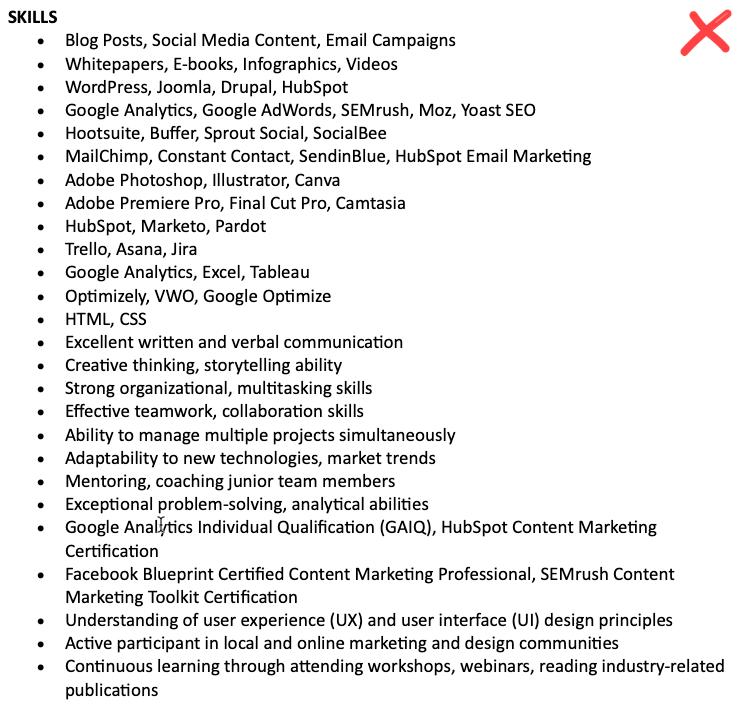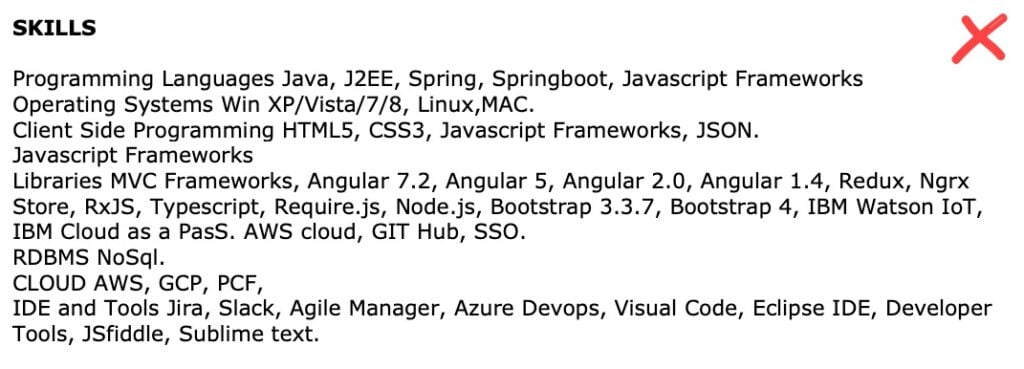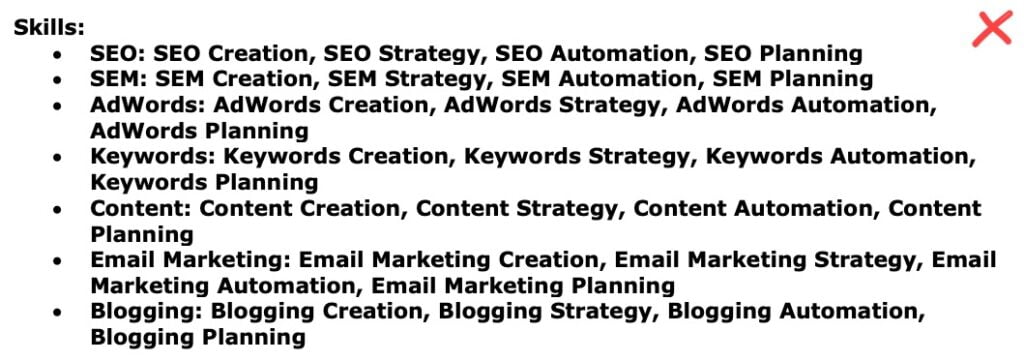Which skills should you list in your resume? Everything you have? Only hard skills? In this post, we go over the best practices in building a skills section that will make your resume stand out.
Table of Contents
- The key role of the resume skills section
- Avoid listing too many skills
- Don’t forget to include the skills section
- Make sure to include both hard skills and soft skills
- Tailoring your skills section for each job
- Using keywords carefully: Balancing ATS and human reviewers
- Be honest about your skills in your resume
- Pay attention to your audience – the recruiter and the hiring manager
- Make your skills section work: A thoughtful approach
- Conclusion
The key role of the resume skills section
Resume skills become central in job hiring
The way companies hire people is changing. The skills in your resume are now often more important than experience or qualifications. A recent study published by Harvard Business Review analyzed over 50 million job descriptions showing that employers are focusing more on skills on a resume than on degrees or years of experience. LinkedIn CEO, Ryan Roslansky, confirmed that skills are what matter most in hiring. So, it’s vital to show your skills section well on your resume. In the next sections, we’ll look at best practices and common mistakes and how to talk about your resume skills effectively, helping you get noticed by employers.
Quick resume reviews by recruiters – short time, many resumes
Recruiters have to look at many resumes in a short amount of time. A study by Ladders shows they might spend only 7.4 seconds looking at each resume at first. So, your resume must grab their attention fast, especially in industries like tech, where lots of people apply for each job. This is exceptionally true for remote jobs, where the number of applications can be more than a thousand.
The spotlight: Your skills section
Having a stellar skills section helps you stand out quickly, so we must make it clear and focused. Another way to look at it is that a lacking skills section can get your resume rejected immediately without further review of other sections in your resume. In the next sections, we will review best practices and learn how to avoid some common mistakes.
Avoid listing too many skills
A too-busy skills section can hide your value
It might seem like a good idea to list all of your skills on a resume. But a too-busy list can actually make the most important skills harder to see. Recruiters need to find the most important information fast, so every skill you put in must be carefully chosen.

Strategy: Choose and focus
To do this well, look carefully at the job description. Pick skills for your resume that match what the employer is looking for. A short, focused list of skills guides the recruiter to the most important information, helping your resume move to the next screening step. You should aim for a short list of between 6 to 10 skills. We will explore more about how to pick and show your skills on a resume later in this post.
Don’t forget to include the skills section
Not having a skills section on your resume can cause you to miss a vital opportunity to connect with the recruiter. It doesn’t only limit your ability to show what you can do but might also cause recruiters to miss your application in the first few important seconds of looking at it.
Recruiters usually spend only a very short time quickly looking through a resume for the first time. When you don’t list your skills in a resume, the recruiter has to try to guess them from your work experience and education, which can make things difficult for them and reduce your chances of success. We’ll talk more later about how to create a skills section that instantly tells the recruiter about your suitability and abilities.
Make sure to include both hard skills and soft skills
Including both hard skills (like Python or SEO) and soft skills (like teamwork or communication) is crucial to making your resume appealing. Some people only mention technical skills, which might limit their appeal to just technical roles. On the other hand, only talking about soft skills might make you appear lacking in technical abilities. Your goal is to show that you are capable in both technical and interpersonal areas by listing a good mix of skills for a balanced resume. Put the most important soft skills first, followed by your technical skills.

Tailoring your skills section for each job
Uniform skills lists aren’t effective
Using the same skills list for every job application might cause you to miss out on opportunities. Different jobs, even with the same title and even for the same company, can have significantly different requirements. Hiring managers aim for well-rounded teams and therefore emphasize the skills their teams miss the most. For example, one job description might highlight teamwork and collaboration, while another job description might highlight the ability to work independently. Not adjusting your skills to each job doesn’t just reduce your chances of being noticed among other applicants but can also make you appear not fully suitable for the role.
Customization speaks louder
Adjusting your skills list to match what the job requires means making your expertise line up exactly with what is needed. Look at the job description to understand which job skills are most important. For instance, if data analysis is crucial and you have experience in it, make sure it’s not just listed but is one of the first skills on a resume mentioned. This careful customization helps your application stand out and speak directly to what the hiring manager is looking for.
Using keywords carefully: Balancing ATS and human reviewers
Using keywords related to the job description helps your resume get through automated tracking systems (ATS). However, using too many—or “keyword stuffing”—can have drawbacks. Using a lot of keywords might help with digital screening and search, but remember that a person, like a recruiter or hiring manager, will also look at your resume. Your resume skills should show real proficiency while also containing the necessary keywords in a natural way. As you work on your skills section, remember to keep this balance to pass digital screening and also keep the reader engaged, ensuring clarity and real expertise are clear in your resume.

In a separate post, we guide you through a method to include keywords in your skills section smoothly, making sure it appeals to both digital systems and people reading it.
Be honest about your skills in your resume
The risks of being untruthful
It’s so important to be real and honest during your job search. When you add things to your resume that aren’t true, it risks your chances and could get you in trouble. For example, making things up on your resume could lead to losing your job or even facing legal problems.
Checking facts with ATS
Remember, systems like Applicant Tracking Systems (ATS) and careful recruiters look for mistakes in applications using various methods. They might check your online history or ask your references detailed questions.
The stress of pretending
If you do get the job without being honest, trying to hide it can hurt your job performance and your mental health. Also, if people find out you weren’t honest, it could cost you your job and your reputation and make it hard to find work in the future.
The importance of being ethical
While it’s advised to market your skills and capabilities properly, it should focus on your actual skills with room for learning and growing. If you miss critical skills for a job, move on and find a better one where you can truly shine. This honesty builds trust with potential employers and helps you find jobs that perfectly fit your abilities, which supports your long-term career and everyday satisfaction.
Pay attention to your audience – the recruiter and the hiring manager
Finding the right way to explain your skills on a resume to both recruiters and hiring managers can be tricky. Recruiters might not understand technical terms while hiring managers want to see depth in your job skills. You need to find a middle way: be clear and provide enough details about your skills while explaining any technical terms simply by providing context. For example, a full-stack engineer can include “SQL and NoSql Database Management: PostgreSQL, MongoDB, Firebase” to make sure everyone gets what they need to evaluate their resume.
Make your skills section work: A thoughtful approach
Understand what the job needs
Get to know what the job really needs by paying close attention to the job description, especially the Required Qualifications and Job Responsibilities sections. This helps you see what skills and abilities the employer is really looking for.
Choose your skills for your resume wisely
List skills that match your true expertise but that are also mentioned in the job description. Think about both your technical skills and soft skills, like leading a team or solving problems, to give a complete holistic picture of what you can do.
Find a balance for ATS and people
Make a skills list that works for both ATS systems and people reading your resume. Write it such that you describe your skill in the same way that this skill is referred to in the job description.
Go beyond basic
Try not to use generic phrases like “Team Player.” Use phrases that show more about what you really do. For example, instead of general “Communication Skills,” you might say “Cross-Team Communication” if the job involves working with different departments.
Being specific about your skills helps recruiters see how you fit the job and shows you’ve really thought about how you and the employer match up. The next article will give more practical steps on how to make your skills section work for every job application.
Conclusion
Choose accuracy over quantity
In the changing world of hiring, it’s really valuable to be precise about your skills on a resume. A well-thought-out skills section is an active part of your resume, helping you get past the first quick look from recruiters and into the ‘maybe’ pile. It’s not just a nice option to tailor your resume—it’s a must. Fortunately, tailoring your skills list is quite straightforward.
Use a focused job application strategy
As hiring focuses more on skills, your resume should reflect the specific needs of each job description. Look for a detailed guide on how to tailor your skills section in the next article. This will help your application not just get the initial screening but also stand out to the hiring manager during a closer review. Keep tuning your resume, making sure each skill you put in is a true reflection of your abilities.

Leave a Reply